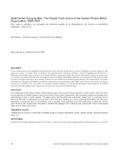Mostrar o rexistro simple do ítem
Dios viaja en autobús: la campaña de camiones-capilla de la Organización de Socorro a Sacerdotes Orientales, 1950-1970
| dc.contributor.author | Sterken, Sven | |
| dc.date.accessioned | 2019-05-28T09:24:57Z | |
| dc.date.available | 2019-05-28T09:24:57Z | |
| dc.date.issued | 2013 | |
| dc.identifier.citation | Sterken, S. (2015). Dios viaja en autobús. Actas De Arquitectura Religiosa Contemporánea, 3, 96-105. https://doi.org/10.17979/aarc.2013.3.0.5090 | es_ES |
| dc.identifier.issn | 2340-5503 | |
| dc.identifier.uri | http://hdl.handle.net/2183/23033 | |
| dc.description.abstract | [Resumen] Como consecuencia de la Segunda Guerra Mundial, doce millones de alemanes se vieron obligados a buscar refugio en otro lugar en su país. Su suerte atrajo la atención de organizaciones caritativas católicas, como la Organización de Socorro a Sacerdotes Orientales, que les proporcionó ayuda material y espiritual a través de una flota de capillas móviles. En este artícu- lo se afirma que esta acción fue una forma genuinamente moderna del trabajo misionero, en el sentido de que tanto su méto- do como mensaje fueron hijos de su tiempo: viviendo en una cultura de la movilidad generalizada y de comunicación de masas, la palabra de una iglesia triunfalista se extendió reclamando su superioridad moral sobre otras visiones del mundo, en particu- lar sobre el comunismo. Por otra parte, los camiones capilla anticiparon un cambio de paradigma fundamental en el cuidado pastoral, llevando la iglesia a las personas en contra de lo que sucedía habitualmente. | es_ES |
| dc.description.abstract | [Abstract] In the aftermath of World War II, twelve million Germans were forced to seek refuge elsewhere in their country. Their sort attracted the attention of Catholic charities such as the Eastern Priests Relief Organization, which provided material and spiritual assistance through a fleet of mobile chapels. This paper claims that this action was a genuinely modern form of missionary work in the sense that both its method and message were a child of its time: dwelling on a culture of generalized mobility and mass communication, it spread the word of a triumphalist church claiming moral superiority over other world views, in particular communism. Moreover, the chapel trucks anticipated a fundamental paradigm shift in pastoral care, bringing the church to the people rather than the other way around. | es_ES |
| dc.language.iso | eng | es_ES |
| dc.publisher | Universidade da Coruña | es_ES |
| dc.relation.uri | https://doi.org/10.17979/aarc.2013.3.0.5090 | es_ES |
| dc.rights | Atribución-NoComercial 4.0 España | es_ES |
| dc.rights.uri | http://creativecommons.org/licenses/by-nc/3.0/es/ | * |
| dc.subject | Misión | es_ES |
| dc.subject | Organización de Socorro a Sacerdotes Orientales/Ayuda a la Iglesia Necesitada | es_ES |
| dc.subject | Capillas móviles | es_ES |
| dc.subject | Diáspora alemana | es_ES |
| dc.subject | Guerra Fría | es_ES |
| dc.subject | Eastern Priests Relief Organization/Aid to the Church in Need | es_ES |
| dc.subject | Missionary work | es_ES |
| dc.subject | Mobile chapels | es_ES |
| dc.subject | German diaspora | es_ES |
| dc.subject | Cold War | es_ES |
| dc.title | Dios viaja en autobús: la campaña de camiones-capilla de la Organización de Socorro a Sacerdotes Orientales, 1950-1970 | es_ES |
| dc.title.alternative | God Comes Along by Bus: The Chapel Truck Action of the Eastern Priests Relief Organization, 1950-1970 | es_ES |
| dc.type | info:eu-repo/semantics/article | es_ES |
| dc.rights.access | info:eu-repo/semantics/openAccess | es_ES |
| UDC.journalTitle | Actas de Arquitectura Religiosa Contemporánea | es_ES |
| UDC.volume | 3 | es_ES |
| UDC.startPage | 96 | es_ES |
| UDC.endPage | 105 | es_ES |






